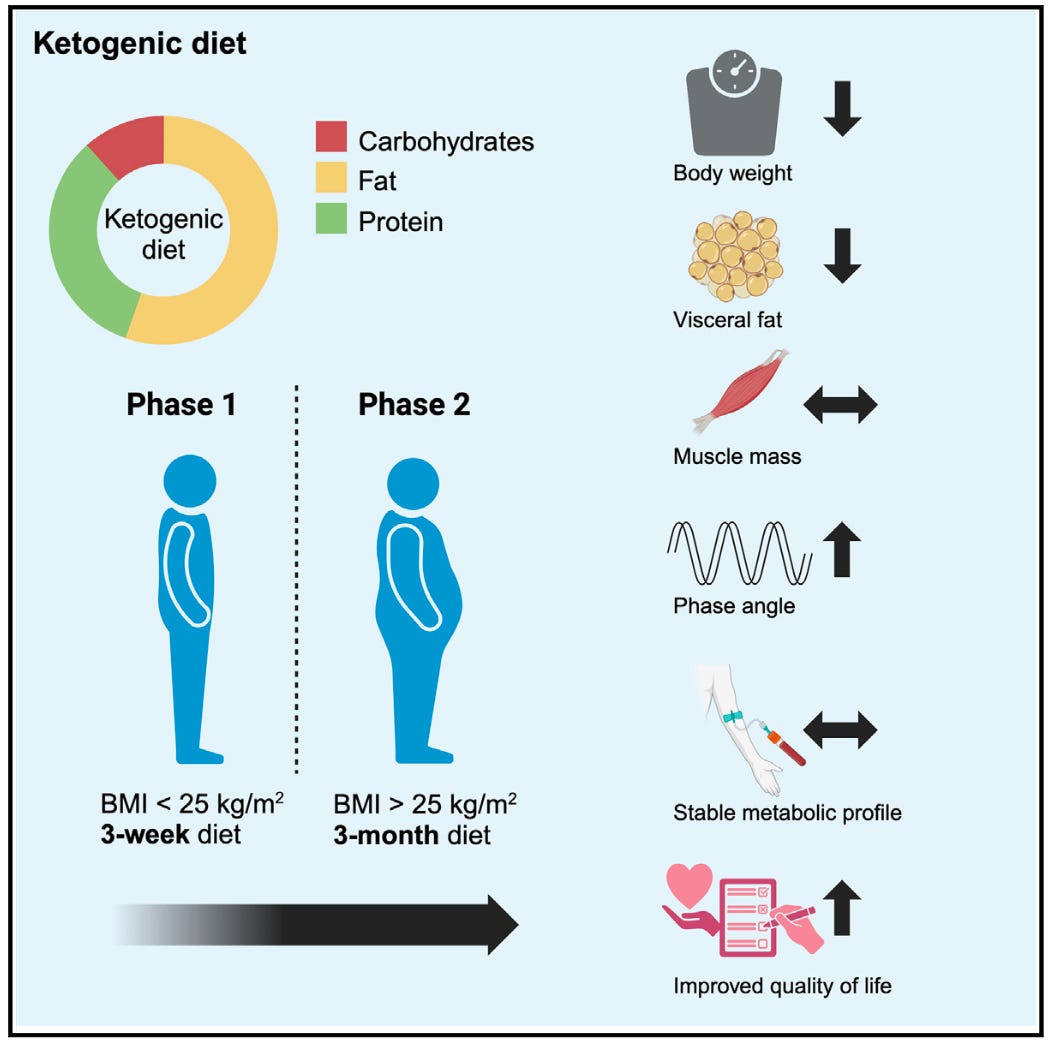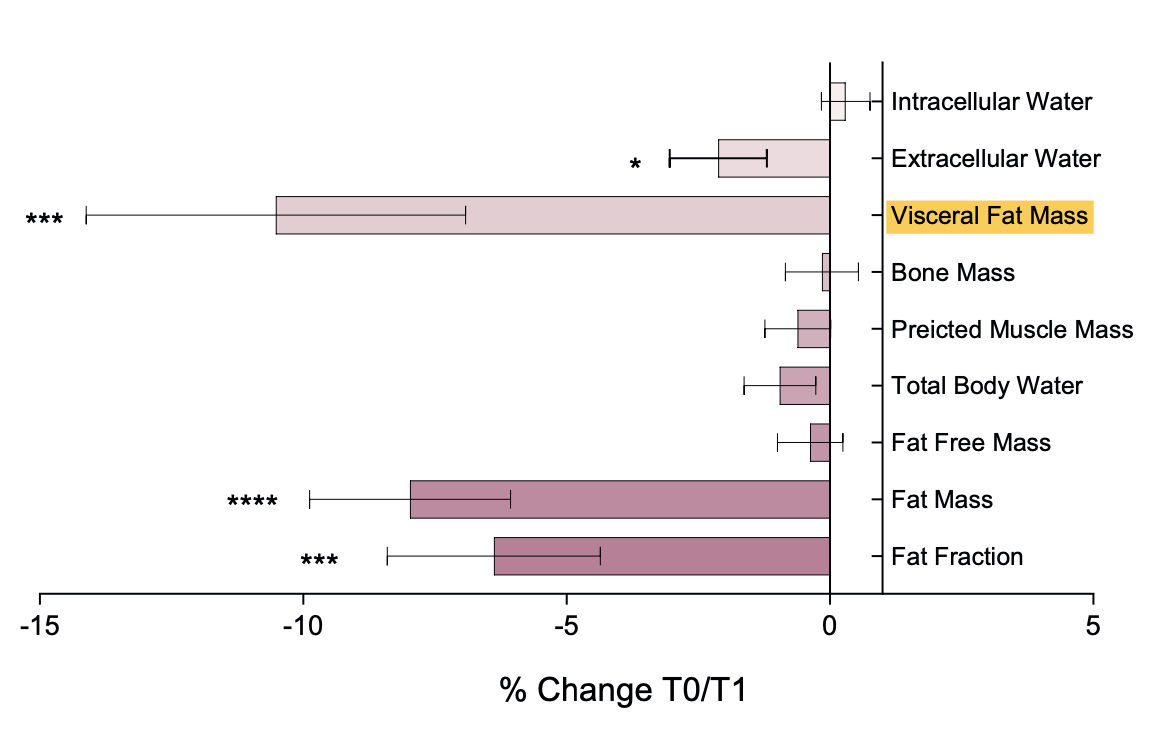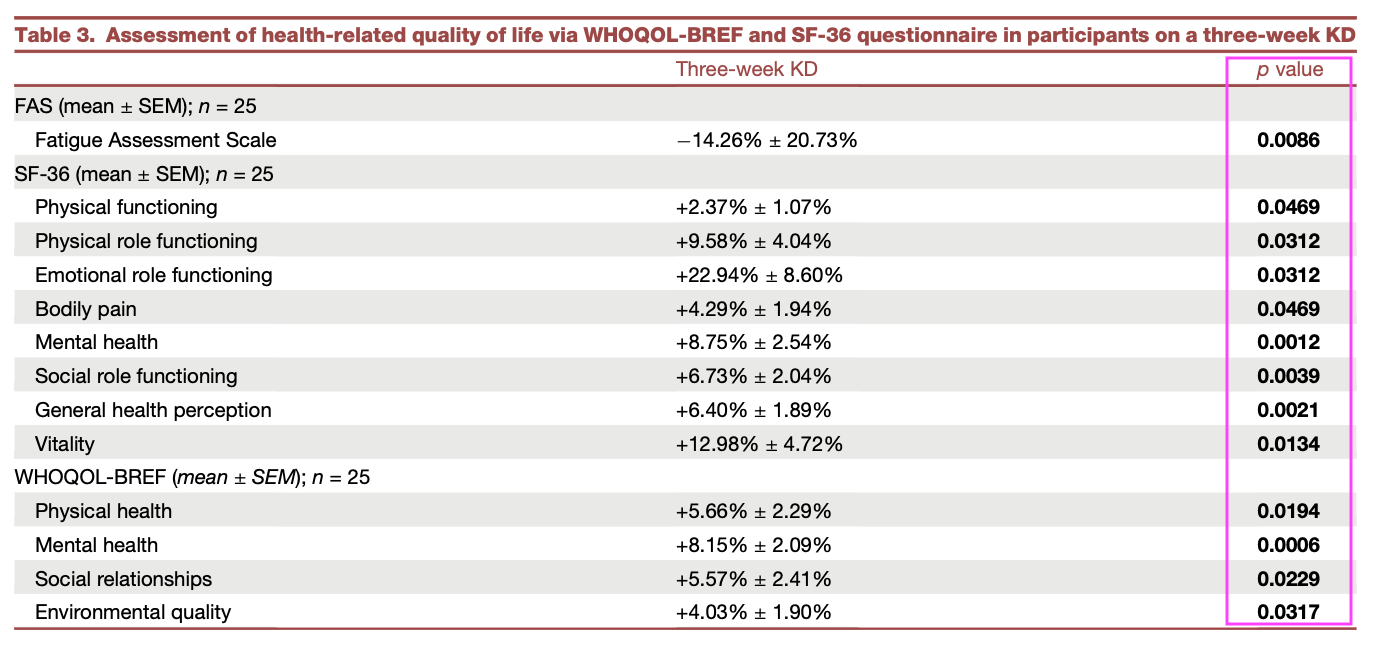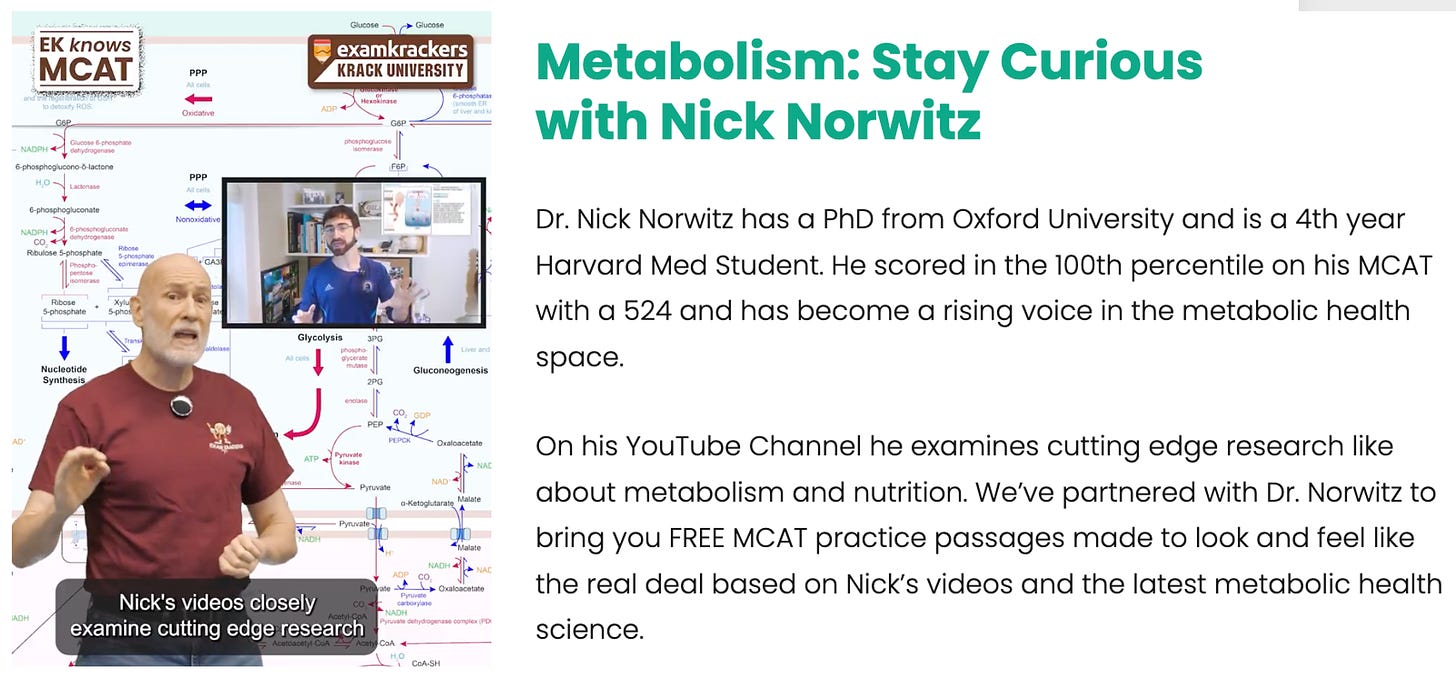How to Eviscerate Visceral Fat: Macros & Micros
Visceral fat contributes to inflammation and chronic disease. 2 new studies reveals potential solutions. We also delve into Keto Diet stigma, Quality of Life, and I talk about exciting initiative!
Warning: This one is A LOT. I’m scrambling to write it at Boston Logan as I board my flight to India. But I think you’ll love it! I’m overflowing with enthusiasm!
Three days ago, I released a video covering an 18-month randomized controlled trial suggesting that specific foodstuffs, including green tea and a specific “space vegetable” (yes, you heard that right) may help preferential burn visceral fat.
At a high-level, compounds made by the microbiome — hippuric acid and urolithin A — from precursors in these foods (benzoic acid and ellagitannins) may sensitize visceral fat to being “burned” off the body.
If you want more on that trial, see the video. And check out the video notes below the video for a glossary of terms and nutrients guide highlighting foods where you can get these nutrients, including Andean Blackberry wine, Scottish Strawberry and more.
But this newsletter isn’t about that trial, per se…
New Study on Ketogenic Diet, Visceral Fat and Quality of Life.
Coincidently, after I released this video, a brand new interventional trial was published in iScience at Cell Press entitled, “The impact of a ketogenic diet on weight loss, metabolism, body composition and quality of life.”
The aim of the study was to fight ketogenic diet stigma with data to help “treat” myths and misperceptions about a powerful metabolic therapy that — while not a silver bullet for all disease — is grossly underutilized for conditions ranging from autoimmune and inflammatory conditions, type 1 diabetes and type 2 diabetes, and mental health and neurological diseases.
In the authors’ words:
“[I]t is surprising that KD is not widely used to treat nutrition-related diseases… To this day, prejudices persist that KD has a negative impact…
Study Design
The study itself had two stages. The first was a 3 week feasibility study in healthy, lean participants. The second was an expansion including adults with overweight/obesity for 3 months of ketogenic diet therapy.
Eucaloric Keto Diet: The KD were designed to be eucaloric (i.e. to maintain weight) based on standard Calorie Counting Calculators (specifically, “Harris-Benedict-Equation, adjusted to the respective [participant’s] physical activity.
Measures: The study measured body composition, metabolic panels, and quality of life based on the World health Organization’s quality of life assessment (WHOQOL-BREF), which consists of four domains: "Physicalhealth," "Mental health," "Social relationships," and "Environmental quality." They also used the Short form health survey (SF-36) survey to assess quality of life. For each of the Quality of Life Scales (WHOQOL-BREF and SF-36), the final score ranges from 0 to 100, where higher is better.
And to assess fatigue they used the FAS scale. For the fatigue scale scores ranged from 10 to 50, with a higher score indicating more severe fatigue.
Ketone Monitoring: They also confirmed dietary compliance with routine ketone measurements.
Control Group: And, while this wasn’t a randomized trial, they did include a eucaloric standard mixed macronutrient diet control in the 3 week study, with “detailed nutritional counseling from a board-certified nutritionist” This control “standard” diet intervention resulted in “no significant changes to any parameter.”
Results: Visceral Fat Reduction
They found, despite the “eucaloric” nature of the diet, participants lost weight - in both the 3 week and 3 month studies. (That’s -1 Point for "CICO.”)
And those with higher starting BMI tended to lose more weight.
More importantly total and visceral fat were reduced, but muscle mass and bone mass were maintained.
Even in the 3 week study, visceral fat was reduced 10.8% (shown below). And in the 3 month trial, visceral fat mass was reduced 14.7%!
In terms of metabolic changes in the 3 week trial in healthy subjects:
C-reactive protein (CRP) trended downward without statistical significance (- 0.19 mg/dL)
Cholesterol, LDL cholesterol, ApoB, and triglycerides (TG) remained unchanged.
HDL cholesterol increased (+4.8, p = 0.047)
Ketosis was confirmed, with mean beta-hydroxybutyrate levels of 1.45 ± 0.95 mmol/L at the end of the diet.
In terms of metabolic changes in the 3 month trial in subjects with overweight or obesity:
C-reactive protein (CRP) trended downward without statistical significance (- 0.11 mg/dl)
Cholesterol, LDL cholesterol, ApoB, and triglycerides (TG) remained unchanged.
HDL cholesterol increased (+5.7, p = 0.012)
Ketosis was confirmed, with 25 of 30 enrolled participants maintaining ketosis throughout the whole 3 months. 4 dropped out early and one was excluded for not maintaining ketosis. Otherwise stated, 83.3% of participants were able to maintain nutritional ketosis throughout the 3 month trial.
Results: Quality of Life Improvement
And - perhaps most importantly - Quality of Life was improved across all domains. And fatigue was reduced in overweight patients.
The paper concludes: “[W]e here show that a ketogenic diet is a feasible and safe nutritional intervention… [Participants exhibited] weight loss, improve[d] quality of life, and [reduced] overweight-related fatigue.”
And interprets these findings as further strong evidence that ketogenic diet stigma is unfounded. Rather than perpetuate fear, we need to find a way to support patients in designing well-formulated ketogenic diets to serve their unique metabolic needs.
Summary of Points on Visceral Fat
To bring things back to the high level and practical, here are my high level thoughts on visceral fat reduction.
Carbohydrate restriction (including ketogenic diets) and intermittent fasting are generally effective for fat loss, while maintaining muscle and bone mass.
There may be a particular benefit on visceral fat loss, even over as short time frames at 3 weeks.
In addition, there may be benefit from including specific foods in your diet the promote the generation of compounds that sensitize visceral fat. Some of these foods are low-carb, e.g. Green Tea and the “Space Vegetable” mentioned in the video.
Of note, not all of these foods are very low carb per se, such as particular berries (e.g. cloudberries, artic bramble, raspberries, strawberries) and pomegranate. But many are low-carb friendly (e.g. Green tea, Wollfia globosa, and walnuts). In truth, there are many ways to skin a cat.
And while there likely are particular metabolic benefits of ketogenic/low-carb diets in those with overweight/obesity/insulin resistance, if low-carb isn’t for you there’s no need to be dogmatic or religious about it. And this certainly isn’t an issue that need partition alone “plant-based” versus “animal-based” lines.
Summary of Points on Ketogenic Diet and Quality of Life
I’ll just reinforce:
“Quality of Life was improved across all domains. And fatigue was reduced in overweight patients.”
Need I say more?
If you agree these data are important, please share!
Exciting Initiatives:
Teaching Tomorrow’s Doctors
I’m in the process of my multi-pronged attack to “Put the Metabolic Back in Medicine!”
Part of this initiative includes teaching the next generation of physicians about metabolic health by providing MCAT-style passages associated with my videos via the Company ExamKrackers!
Click HERE to hear from the ExamKracker’s CEO, Jon Orsay.
So if you know a pre-medical student, please have them check out these FREE materials to learn about metabolic health while boosting their MCAT score! And, if they want to access ExamKrackers comprehensive preparation materials, they can use discount code NICK10, HERE.
Teaching Today’s Doctors Students:
Additionally, I may be working with the Metabolic Health Initiative to get select videos covering the newest metabolic health literature CME-accredited.
We are going to try to go above and beyond to make this great value for you, including high-end video editing and collaborations with the core research teams publishing the papers so you can hear from the horses mouth!
And that’s just the tip of the Iceburg! Things are going to change - FAST. We are starting a metabolic revolution! And I want you to be a part!








diet is extremely powerful and even one "type" of diet can be declinated in different ways! low carb or keto work on metabolic health that is also brain health, heart health, liver health... cellular health... and mitochondria health! we have to open mind on different approaches and open eyes on what people say back, how they feel.. when some one or more say "you save my life" maybe there is something good! waiting you on metabolic health initiative! I am on the platform since the beginning :))))))))